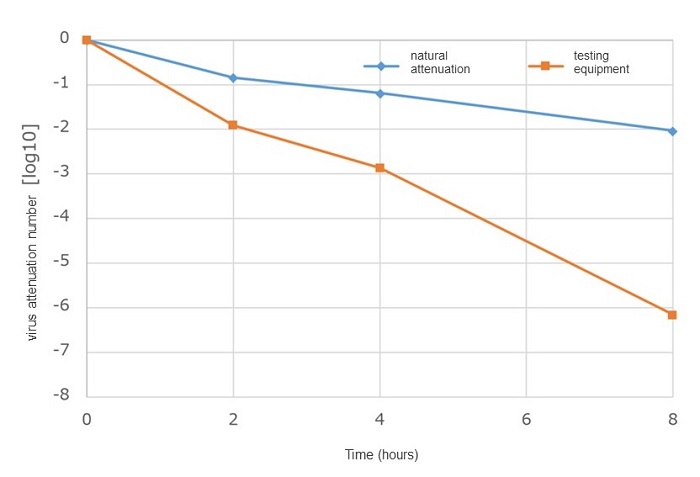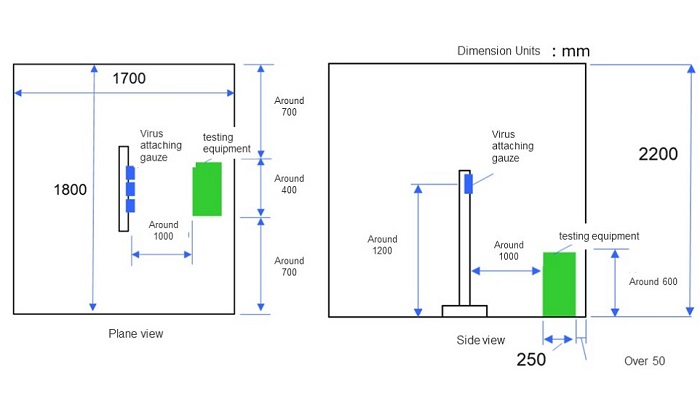Text begins from here.
Available Chlorine Component Vaporized from Electrolyzed Water(*1) Inhibits More Than 99.99% of the adhered Novel Coronavirus
Panasonic Ecology Systems Co., Ltd. (PES) has recently verified that the available chlorine component vaporized from electrolyzed water, inhibits more than 99.99% of the adhered Novel Coronavirus (SARS-CoV-2) in eight hours in collaboration with the global contract research organization Texcell(*2).
Electrolyzed water has a powerful effect on sterilization and deodorization. PES has researched hypochlorous acid technology for over 30 years since it employed hypochlorous acid water as part of the system to maintain the optimal sanitary conditions of beverage vending machines with an automatic cup dispenser in 1987(*3).
In a joint effort with a public research institute, PES has demonstrated that hypochlorous acid has an inhibitory effect on the novel influenza virus, MRSA (methicillin-resistant Staphylococcus aureus), rotavirus, etc. In the recent test conducted with Texcell, the company verified that the available chlorine component vaporized from the electrolyzed water inhibits more than 99.99% of the Novel Coronavirus (SARS-CoV-2) in eight hours in a space of approx.6.7 m3.The current verification results present basic research data and were not used to evaluate product performance equipped with electrolyzed water.
PES will continue to improve hypochlorous acid technology in an effort to contribute to clean and comfortable indoor air quality.
Details of verification of the inhibitory effect on the Novel Coronavirus (SARS-CoV-2)
[Verification method]
The Novel Coronavirus (SARS-CoV-2) was subjected to comparative testing based on two conditions, one in which the available chlorine component of the electrolyzed water was vaporized into the air and the other where it was not (was naturally attenuated).
[Verification results]
In the condition where the available chlorine component of the electrolyzed water was vaporized in the air, more than 99.99% of the Novel Coronavirus (SARS-CoV-2) was inhibited in eight hours, in contrast to the condition where it was not (was naturally attenuated).
[Data]
. Testing agency: Texcell
. Target: Novel Coronavirus (SARS-CoV-2)
. Equipment: Ventilated vaporizer using the electrolyzed water (*4)
. Method: A piece of gauze to which the Novel Coronavirus (SARS-CoV-2) was adhered was placed in a confined space of approx. 6.7 m3, in the condition under which the testing equipment was operated. The viral infectivity was then measured and the inhibition rate was calculated.
. Results: The inhibition of more than 99.99% of the virus in eight hours was verified, in contrast to the condition where it was not (was naturally attenuated).
| time | Inhibition rate (v.s. natural attenuation) |
|---|---|
| 2 hours | 91.48% |
| 4 hours | 97.86% |
| 8 hours | More than 99.99% |
*1: Solution made by the electrolysis of salt water.
*2: Texcell is a specialized agency established as the first spin-off from the Institut Pasteur in Paris and is capable of conducting GLP conformance tests such as viral and viral clearance testing. It is a globally recognized testing agency and has bases in France, Germany, United States, Taiwan, and Japan.
*3: Including the history of the SANYO Electric era.
*4: pH: Approx. 8.5, Available chlorine concentration: 10 to 40 mg/L.
[Detail of verification results]
Results: The inhibition of more than 99.99% of the virus in eight hours was verified, in contrast to the condition where it was not (was naturally attenuated). (Figure:1)

(Figure:1) Verification of the inhibitory effect on the Novel Coronavirus (SARS-CoV-2)
[Outline of testing space]

Sub Menu begins from here.